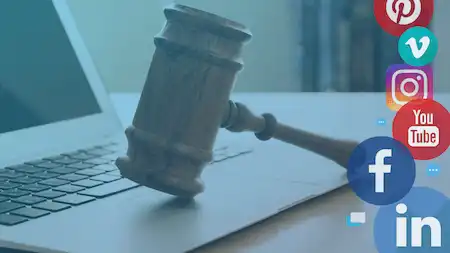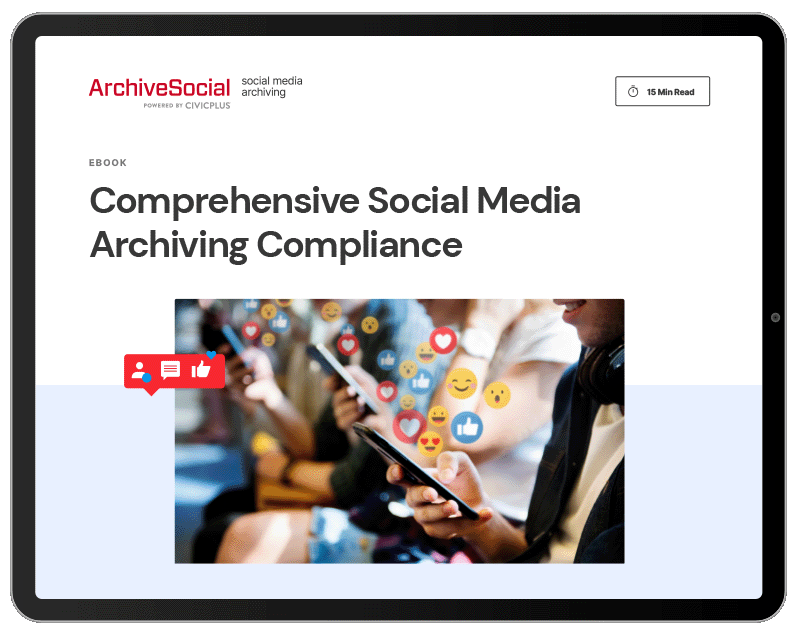Public Records Laws and Social Media Retention in
Arizona
Arizona Public Records Law and Social Media
The Arizona Public Records Law requires that government agencies preserve public records regardless of physical form, including electronic records. This law applies to social media records in Arizona.
View Arizona Law Text
41-151.18. Definition of records
In this article, unless the context otherwise requires, “records” means all books, papers, maps, photographs, or other documentary materials, regardless of physical form or characteristics, including prints or copies of such items produced or reproduced on film or electronic media under section 41-151.16, made or received by any governmental agency in pursuance of law or in connection with the transaction of public business and preserved or appropriate for preservation by the agency or its legitimate successor as evidence of the organization, functions, policies, decisions, procedures, operations or other activities of the government, or because of the informational and historical value of data contained in the record, and includes records that are made confidential by statute.
Guidance from the Office of the Arizona Secretary of State
Arizona Secretary of State Records Analyst Jerry Lucente-Kirkpatrick discusses the intersection of social media and records management in this clip. Watch the full recording here.
Excerpt from a Government Technology Webinar on February 17, 2015.

Social Media Records Guidelines from the Arizona Attorney General
The Arizona Agency Handbook issued by the Attorney General addresses the need to preserve the embedded metadata in records generated and maintained in an electronic format.
View the Arizona Agency Handbook text
2018 Arizona Agency Handbook, Chapter 6
6.3 Types of Public Records.
18. A public record “maintained in an electronic format includes not only the information normally visible upon printing the document but also any embedded metadata,” Lake v. City of Phoenix, 222 Ariz. 547, 551, ¶ 12, 218 P.3d 1004, 1008 (2009);
Legal Precedent for Preserving Electronic Records
In a 2009 case involving email metadata (Lake vs. City of Phoenix), the Supreme Court of Arizona noted, “[w]hen a public officer uses a computer to make a public record, the metadata forms part of the document as much as the words on the page.” This comment highlights the need for sophisticated archiving of social media records in Arizona that goes beyond copying and pasting information visible on a screen or printed copy.
View Lake vs. City of Phoenix
OPINION BALES, Justice.
Arizona law provides that “[p]ublic records and other matters in the custody of any officer shall be open to inspection by any person at all times during office hours.” Ariz.Rev.Stat. (“A.R.S.”) § 39-121 (2001). The City of Phoenix denied a public records request for metadata in the electronic version of a public record. We today hold that if a public entity maintains a public record in an electronic format, then the electronic version, including any embedded metadata, is subject to disclosure under our public records laws.
Arizona Social Media Records Management in Practice
The City of Phoenix offers a great example of a social media policy that explicitly identifies social media as subject to Open Meetings Laws. The City explains that the comments are social media records in Arizona and are subject to disclosure following a public records request.
View Phoenix's Social Media Policy
City of Phoenix Social Media Term of Use/Disclaimer
City of Phoenix employees and public officers (such as Board or Commission members) are reminded that their contributions to social media sites may be considered government speech rather than private speech and may be governed by Arizona and federal laws such as Arizona Open Meetings Law or federal elections and campaign laws.
Whether Arizona’s Public Records Law Extends Beyond its Terms and Applies to Privately Sent Messages
According to a State Attorney General Opinion from July 2017, electronic messages sent or received by a government-issued electronic device or through a social media account provided by a government agency for conducting government business are public records.
View Attorney General Opinion
Questions Presented
Are messages sent and received via texting and social media sites by officers or public bodies that have a substantial nexus to the job public records, even if the employee uses a private cell phone or electronic device?
Summary Answer
Electronic messages sent or received by a government-issued electronic device or through a social media account provided by a government agency for conducting government business are public records. With respect to communications conducted on private devices or accounts, although private devices or accounts do not themselves harbor public records, public officials have an affirmative duty to reasonably account for official activity. This duty encompasses official activity engaged in through private devices or accounts. In other words, public officials cannot use private devices and accounts for the purpose of concealing official conduct.
Social Media Record Retention Legal News in Arizona

A County Supervisor in Arizona was charged with destroying public records after she was unable to comply with a records request for social media from the media.
A public records request by a local newspaper found that some Pima County, AZ, officials were blocking users, deleting comments, and not retaining conversations on social media. The County Administrator had printouts showing deleted records, and the supervisor was charged with destroying public records.
Source: govtech.com, “Are Politicians’ Facebook Comments Public Records?” February 2016
SOCIAL MEDIA ARCHIVING OVERVIEW
How Social Media Archiving Works
Download our solution overview to see how social media archiving helps you achieve public records compliance. Automatically retain every post, photo, comment, and more from your social pages for record retention.
